Kenneth L. Gentry Jr.'s Blog, page 38
March 29, 2022
QUESTIONING GOD’S SOVEREIGNTY (3)
 PMW 2022-025 by Kenneth L. Gentry, Jr.
PMW 2022-025 by Kenneth L. Gentry, Jr.
We have been considering the absolute sovereignty of God in this series on postmillennialism. If one holds to a strong (biblical!) view of God’s sovereignty, then postmillennialism cannot be dismissed out-of-hand by claims that it is to difficult. The only credible argument against postmillennialism can be a biblical argument. But many of the arguments are more emotional than biblical.
In this part of the series I have been considering moral objections to God’s absolute sovereignty. I have been showing that there are other doctrines that Christians hold that are equally objectionable on moral grounds, but which most Christians hold. In this installment I will focus on the doctrine of eternal hell.
Objections against hell
When we come to the doctrine of eternal hell we are entering into a discussion of the most “morally repugnant” and “emotionally repulsive” doctrine within the whole system of Christian theology. Who can seriously contemplate the doctrine of hell without some sort of fear and trepidation? Though historically the Church has affirmed the doctrine of eternal hell, voices within the Christian tradition have long tried to re-interpret this doctrine to make it more palatable. Some have reduced the doctrine of hell to a doctrine of heck. And, of course, opponents of the Christian faith often point to the doctrine as obvious evidence that Christianity could not be true.
Four Views on the Book of Revelation
(ed. by Marvin Pate)
Helpful presentation of four approaches to Revelation. Ken Gentry writes the chapter on the preterist approach to Revelation, which provides a 50 page survey of Revelation .
See more study materials at: www.KennethGentry.com
Influential writers expressing revulsion at the doctrine of hell include the following:
John R. W. Stott has commented (as a conservative, evangelical Christian): “Emotionally, I find the concept intolerable.”
Clark H. Pinnock (who deems himself evangelical) writes: “Whatever the image, the traditional understanding of hell is unspeakably horrible. How can one imagine for a moment that the God who gave his Son to die for sinners because of his great love for them would install a torture chamber somewhere in the new creation in order to subject those who reject him to everlasting pain?”
Christian statement on hell
Nevertheless, Christians have largely agreed that the Bible teaches about hell. The following Confessional statement on hell represents the thinking of perhaps the majority of evangelical Christians. WCF 32:1: “The souls of the wicked are cast into hell, where they remain in torments and utter darkness, reserved to the judgment of the great day.”
Biblical declaration of hell
The Bible undeniably presents eternal hell as the ultimate judgment of the wicked. In fact, more is taught about hell by Christ himself than any other single individual in Scripture. Thus, our view of hell also impacts our view of Christ and his integrity and authority, as the atheist Bertrand Russell observed. Consider the forthright declarations of Scripture — several from our Lord Jesus himself.
You have heard that it was said, ‘You shall not commit adultery’; but I say to you, that everyone who looks on a woman to lust for her has committed adultery with her already in his heart. And if your right eye makes you stumble, tear it out, and throw it from you; for it is better for you that one of the parts of your body perish, than for your whole body to be thrown into hell. And if your right hand makes you stumble, cut it off, and throw it from you; for it is better for you that one of the parts of your body perish, than for your whole body to go into hell. (Matt 5:27–30)
So it will be at the end of the age; the angels shall come forth, and take out the wicked from among the righteous, and will cast them into the furnace of fire; there shall be weeping and gnashing of teeth. (Matt 13:49–50)
Great Tribulation: Past or Future?
(Thomas Ice v. Ken Gentry)
Debate book on the nature and timing of the great tribulation. Both sides thoroughly cover the evidence they deem necessary, then interact with each other.
See more study materials at: www.KennethGentry.com
Then He will also say to those on His left, ‘Depart from Me, accursed ones, into the eternal fire which has been prepared for the devil and his angels. . . .’ And these will go away into eternal punishment, but the righteous into eternal life. (Matt 25:41, 46)
And whoever causes one of these little ones who believe to stumble, it would be better for him if, with a heavy millstone hung around his neck, he had been cast into the sea. And if your hand causes you to stumble, cut it off; it is better for you to enter life crippled, than having your two hands, to go into hell, into the unquenchable fire, where their worm does not die, and the fire is not quenched. And if your foot causes you to stumble, cut it off; it is better for you to enter life lame, than having your two feet, to be cast into hell, where their worm does not die, and the fire is not quenched. And if your eye causes you to stumble, cast it out; it is better for you to enter the kingdom of God with one eye, than having two eyes, to be cast into hell, where their worm does not die, and the fire is not quenched.’ (Mark 9:42–48)
Just as Sodom and Gomorrah and the cities around them, since they in the same way as these indulged in gross immorality and went after strange flesh, are exhibited as an example, in undergoing the punishment of eternal fire. (Jude 7)
And another angel, a third one, followed them, saying with a loud voice, ‘If anyone worships the beast and his image, and receives a mark on his forehead or upon his hand, he also will drink of the wine of the wrath of God, which is mixed in full strength in the cup of His anger; and he will be tormented with fire and brimstone in the presence of the holy angels and in the presence of the Lamb. And the smoke of their torment goes up forever and ever; and they have no rest day and night, those who worship the beast and his image, and whoever receives the mark of his name.’ (Rev 14:9–11)
According to a recent Gallup Poll, 65% of the American population believes in hell, whereas 92% of those who attend church regularly believe in hell (hopefully not because their church service is so bad). The average evangelical Christian accepts the doctrine of hell, despite its intellectual and moral challenges. Yet many of the same Christians reject predestination on identical intellectual and moral grounds. This brings inconsistency into one’s reasoning. We must accept what the Scripture teaches no matter how difficult it may seem to our finite, fallen conceptions.
Click on the following images for more information on these studies:



March 25, 2022
QUESTIONING GOD’S SOVEREIGNTY (2)
 PMW 2022-024 by Kenneth L. Gentry, Jr.
PMW 2022-024 by Kenneth L. Gentry, Jr.
In this series I am arguing for the absolute sovereignty of God as a foundation stone for the postmillennial hope. If we believe God is absolutely sovereign we should not discount postmillennialism on the basis of it seeming so difficult.
In my last article I began considering the leading objections to the doctrine of God’s absolute sovereignty. Many evangelical Christians reject predestination and God’s absolute sovereignty because they are so intellectually difficult to grasp. But I pointed out that Christianity has other equally difficult doctrines, such as the Trinity and the hypostatic union of Christ. Yet, they will gladly affirm these doctrines.
In this article I consider the moral difficulty in accepting absolute predestination. I will quickly introduce two doctrines that are deemed immoral by those outside of Christ, yet are strongly held by Bible-believing Christians: (1) The imputation of sin; (2) the exclusiveness of Christianity. If we can hold to these doctrines despite moral objections, why can we not affirm predestination? In my next article I will introduce the leading moral objection to Christianity.
The imputation of sin
Theologian Wayne Grudem explains the biblical perspective on Adam’s fall and our condemnation: “All members of the human race were represented by Adam in the time of testing in the Garden of Eden. As our representative, Adam sinned, and God counted us guilty as well as Adam. . . . God counted Adam’s guilt as belonging to us. . . . God rightly imputed Adam’s guilt to us.”
PREDESTINATION MADE EASY
By Ken Gentry
A thoroughly biblical, extremely practical, and impressively clear presentation of
the doctrine of absolute predestination.
See more study materials at: www.KennethGentry.com
Grudem comments on the moral revulsion to this doctrine: “When we first confront the idea that we have been counted guilty because of Adam’s sin, our tendency is to protest because it seems unfair. We did not actually decide to sin, did we? Then how can we be counted guilty? Is it just for God to act this way?”
Yet this understanding comes directly from Scripture:
“Until the Law sin was in the world; but sin is not imputed when there is no law. Nevertheless death reigned from Adam until Moses, even over those who had not sinned in the likeness of the offense of Adam, who is a type of Him who was to come. . . . So then as through one transgression there resulted condemnation to all men, even so through one act of righteousness there resulted justification of life to all men. For as through the one man’s disobedience the many were made sinners, even so through the obedience of the One the many will be made righteous.” (Rom 5:13–14, 18–19)
If we deny the moral legitimacy of imputation, we are denying the direct biblical teaching on the subject. To make matters worse, this method ends up destroying our own salvation. For if it is morally inappropriate for one to act in the place of another as his representative, then it is wrong for Christ to act in our place to secure our salvation through his merit! Once again, the methodology employed to dispute predestination comes back to haunt us.
The exclusiveness of Christianity
The doctrine of Christian exclusivism declares that salvation only comes through Christ and his covenant and by means of a personal faith in him. In order to be saved men must exercise faith in his name. It further teaches that no one can be saved without personally professing faith in Christ’s name, no matter how “religious” they are in their devotion, how “good” they may be in their conduct, how “innocent” they may appear to others, or how “disadvantaged” is their cultural context.
Regarding this matter, three views of salvation have arisen among theologians:
Pluralism: “A pluralist is a person who thinks humans may be saved through a number of different religious traditions and saviors.” On this view, all the great world religions are acceptable to God in that they arise out of man’s sincere striving to find and please God. Hence, the view is “pluralistic” in that it accepts a plurality of religions.
Inclusivism: “Inclusivists believe that salvation is impossible apart from Jesus and that he is the only Savior. But this does not mean that people have to know about Jesus or actually believe in him to receive that salvation.” On this view, Jesus is the only Savior, but his salvation includes (therefore, is “inclusive”) those who do not personally know him in faith.
Exclusivism: “Christian exclusivism can be defined as the belief that (1) Jesus Christ is the only Savior, and (2) explicit faith in Jesus Christ is necessary for salvation.” This is the orthodox view that is held by the vast majority of evangelical Christians.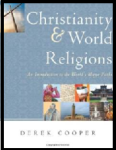
Christianity and the World Religions:
By Derek CooperCooper. Examines the rival worldviews found in Hinduism, Buddhism, Confucianism and Taoism, Judaism, Islam, and irreligion. He engages these worldviews from a Christian perspective.
See more study materials: www.KennethGentry.com
The reasons the first two views exist at all is due to the methodological bugaboo we have been considering: emotional reflex and moral revulsion. This time the reflex is against the notion that decent people, through no fault of their own, living in non-Christian lands would be condemned by a loving, merciful God.
The inclusivist further notes that this is problematic in that God’s Son died for the sins of the world. For instance, as evangelical theologian Ron Nash notes of John Hick: “Hick’s encounters with devout and moral non-Christians led him to think it was no longer possible to ‘argue that Christianity or Christ is the sole means of salvation since it is evident that many outside Christianity, and outside the influence of the historical Jesus, are in fact saved.’”
Yet the Bible expressly and dogmatically teaches this view of salvation known as “exclusivism.” This has been the historic position of the orthodox Christian church. In fact, this view underscores the necessity of the Christian faith and the significance of the Christian evangelistic and missionary outreach. Consider the following passages:
“Jesus said to him, ‘I am the way, and the truth, and the life; no one comes to the Father, but through Me.’” (John 14:6)
“If you confess with your mouth Jesus as Lord, and believe in your heart that God raised Him from the dead, you shall be saved; for with the heart man believes, resulting in righteousness, and with the mouth he confesses, resulting in salvation . . . for ‘Whoever will call upon the name of the Lord will be saved.’ How then shall they call upon Him in whom they have not believed? And how shall they believe in Him whom they have not heard? And how shall they hear without a preacher? And how shall they preach unless they are sent? Just as it is written, ‘How beautiful are the feet of those who bring glad tidings of good things!’” (Rom 10:9–10, 13–15)
So then, despite the “moral difficulty” of this historic Christian exclusivistic understanding of eternal salvation, the average Christian recognizes its necessity. Remarkably, many who oppose predestination on moral grounds will nevertheless affirm exclusivism, despite the same moral difficulty.
Click on the following images for more information on these studies:


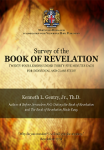
THE NT & ISRAEL’S FAILURE
 PMW 2018-042 by Kenneth L. Gentry, Jr.
PMW 2018-042 by Kenneth L. Gentry, Jr.
As John writes the Book of Revelation, Israel has been a part of the Roman regime for almost a century. As such she enjoyed special leagues of “friendship and mutual alliance” which began with Julius Caesar (Jos. Ant. 14:10:1 §185). Her love for Caesar was so great that after he was murdered, Jews wept for many nights at the site of his cremation (Suetonius, Jul. 84:5). Josephus, a priestly member of the Jewish aristocracy, praises Julius and records many of the treaties with the Jews which were established by Caesar and later Roman authorities (Ant. 14:10:2-25 §190-267). He then declares: “there are many such decrees of the senate and imperators of the Romans and those different from these before us” (Ant. 14:10:26).
Israel engages these alignments despite her OT prophets condemning unholy alliances as harlotry (e.g., Hos 7:11). As we read in Rev 13, the exercise of the Land beast’s authority is “in his [the Roman emperor’s] presence” (13:1a). Later in Rev 17 we see Israel’s alliance symbolized by a harlot engaged in a drunken sexual orgy with the sea beast.
The NT repeatedly charges the religious rulers of Israel with rejecting Jesus the Messiah (Mk 8:31; Lk 19:47; 22:52, 54, 66; 23:10; 24:20; Ac 4:8-11; 13:27). As he hangs in agony on the cross “even the rulers were sneering at Him” (Lk 23:35). They do this despite their own Scriptures pointing to him (Mt 13:15-17; Lk 24:25-27; Jn 5:39-40-47). Christ marvels that even the rulers of Israel cannot understand spiritual things (Jn 3:1, 10) and are blind (Jn 9:39-41). They even charge him before Roman authorities with forbidding paying taxes to Caesar (Lk 23:2), threatening mayhem against the temple (Mk 14:58), and promoting insurrection against Rome (Mk 15:2-4).
Christ often forewarns his disciples about the religious rulers’ nefarious designs against him. “From that time Jesus Christ began to show His disciples that He must go to Jerusalem, and suffer many things from the elders and chief priests and scribes, and be killed, and be raised up on the third day” (Mt 16:21//). “Behold, we are going up to Jerusalem; and the Son of Man will be delivered to the chief priests and scribes, and they will condemn Him to death” (Mt 20:18//). He foresees the Jerusalem leadership turning him over to the Roman authorities: “Behold, we are going up to Jerusalem, and all things which are written through the prophets about the Son of Man will be accomplished. For He will be delivered to the Gentiles, and will be mocked and mistreated and spit upon” (Lk 18:31-32).
Israel in the Bible and History (9 mp3 lectures)
by Ken Gentry
The people of Israel are the people of God. But the modern church is divided over the nature, call and identity of Israel. This lecture series covers key issues for understanding the biblical concept of Israel.
See more study materials at: www.KennethGentry.com
Though these are actual prophetic statements which Christ utters during his ministry, they are recorded in each gospel at a later date as an apologetic for Jesus and Christianity over against the Jewish leadership. As such they would doubtlessly be preached and taught in the church as the struggle with Judaism came to a head. “Full weight must be given to the witness of Mark 6:34 (Matt. 9:36) that in the eyes of early Christians the Jewish people were sheep without a shepherd until Jesus appeared to provide genuine spiritual leadership” (D. A. Hare, The Theme of Jewish Persecution of Christians in the Gospel according to St. Matthew, 14).
In John’s Gospel we discover the point in time at which Israel legally becomes apostate: when she chooses Caesar over Christ during his criminal trial. The Jewish religious authorities (“chief priests and the officers,” Jn 19:6; cp. 18:13, 19, 22, 24) go to great lengths to employ Rome’s authority so that they might kill him: they “kept trying to obtain false testimony against Jesus” even bringing “many false witnesses” (Mt 27:59-60).
In fact, they were “accusing Him vehemently” (Lk 23:1-10, 13-20). The Roman procurator Pilate sees that he is clearly innocent so that he “made efforts to release Him, but the Jews cried out, saying, ‘If you release this Man, you are no friend of Caesar; everyone who makes himself out to be a king opposes Caesar’” (Jn 19:12; cp. Ac 17:7). This “friend [philos] of Caesar” statement reminds us of the Jewish leagues of “friendship” (philian) with Caesar (Ant. 14:10:1 §185). Philo mentions that the Jews are “friends to Caesar” (Embassy 36 §280). So then, “the ‘city of the great King,’ had denounced her rightful King” (Walker, 35). And that denunciation seals her doom (see Jesus’ warnings about his approaching betrayal and death, Mt 21:33-45; 22:2-14).
The chief priests vigorously denounce him before the Roman legal authority: “We have no king but Caesar” (Jn 19:15). Bruce observes: “No doubt they were honest in saying that Caesar was the only basileus they knew; their status and privileges depended on their collaboration with the imperial power” (F. F. Bruce, The Gospel of John, 365). They even complain to the procurator that Jesus was “misleading our nation and forbidding to pay taxes to Caesar” (Lk 23:2). This was not the first time they had rejected God as their king (1Sa 8:5-8, 19-20; 12:12).
 “Jesus, Matthew, and the Rejection of Israel” (downloadable mp3)
“Jesus, Matthew, and the Rejection of Israel” (downloadable mp3)
by Ken Gentry
Surveys the Gospel of Matthew and highlights the numerous references — direct and indirect — that suggest that Matthew’s Gospel was written (at least in part) to demonstrate that God was rejecting Israel. A great many passages in Matthew are surveyed and briefly elaborated upon.
See more study materials at: www.KennethGentry.com
As William Milligan (The Book of Revelation, 231) elegantly explains the situation in Jn 19:12-15: “They Caesar’s friends! They attach value to honours bestowed by Caesar! O vile hypocrisy! O dark extremity of hate! Judaism at the feet of Caesar!” Alfred Edersheim states that “with this cry Judaism was, in the person of its representative, guilty of denial of God, of blasphemy, of apostasy. It committed suicide” (The Life and Times of Jesus the Messiah, 2:581). Marvin Taylor ties this in with Rev 13: “They are entirely infidel, throwing off all allegiance to any but Caesar, and cry that they have no other king. It is purely of the Jews, the whole transaction . . . . This is man’s religion, and it will, in the end, enthrone ‘the Willful One’ and bow to his image (Rev. 13).”
Finally in her assertion of Roman judicial authority that Israel stumbles in her transgression (Ro 11:11-12) leading to her rejection (11:15). It is in the presence of Pilate that she cries out for her own judgment: “And all the people answered and said, ‘His blood be on us and on our children!’” (Mt 27:25; cp. Ac 5:28). Operatives of the first beast drove the nails in his hands at the second beast’s insistence (Ac 2:23; 3:13-14); and the dragon is behind it all (Jn 13:2, 27; cp. Col 2:15; Rev 12:4b). Israel’s putting Christ to death is the central theme of John’s drama (1:7) and thus the slaughtered Lamb becomes its leading figure (5:6-13; 13:8). With her glorious heritage and privileges (Ro 3:1-2; 9:1-5) she should have known better than the Gentiles (Lk 23:34; Ac 17:30; Ep 4:17-18).
March 22, 2022
QUESTIONING GOD’S SOVEREIGNTY (1)
 PMW 2022-023 by Kenneth L. Gentry, Jr.
PMW 2022-023 by Kenneth L. Gentry, Jr.
In my current series I have been focusing on God’s absolute sovereignty as an important foundation to the postmillennial hope. If we firmly believe God is sovereign over all things, it should not be difficult for us to believe those Scriptures that teach the universal conquest of the gospel. Not all postmillennialists are Calvinists. But they should be!
But now we need to consider objections to God’s sovereignty in predestination. As this series continues, I will present the two leading objections to God’s sovereignty:
1. Is it logical? How can we comprehend two seemingly contradictory doctrines: predestination and free will? If God predetermines our actions, how can we be free? This turns off many Christians who recognize that man has free will.
2. Is it moral? How can we accept the implications of God’s absolute sovereignty? How could a perfect, just God irrevocably predetermine the eternal destinies of men created in his image? This turns off many Christians who deem God’s sovereignty to be immoral.
In this article I will focus on the first question. So let us begin. Though there are many ways we could approach this question, I have chosen to approach it with the evangelical Christian in mind. What do I mean? We need to recognize that the “logical problem” in sovereignty is not limited to this one issue. We must recognize that a number of commonly accepted theological teachings of Scripture run into this “problem.”
The Beast of Revelation
by Ken Gentry
A popularly written antidote to dispensational sensationalism and newspaper exegesis. Convincing biblical and historical evidence showing that the Beast was the Roman Emperor Nero Caesar, the first civil persecutor of the Church. The second half of the book shows Revelation’s date of writing, proving its composition as prior to the Fall of Jerusalem in A.D. 70. A thought-provoking treatment of a fascinating and confusing topic.
For more study materials, go to: KennethGentry.com
The doctrine of God
Have you ever logically reflected on the doctrine of the Trinity? Wayne Grudem defines the Trinity in this way: “God eternally exists as three persons, Father, Son, and Holy Spirit and each person is fully God, and there is one God.” What evangelical Christian doubts this definition? It is foundational to the Christian faith.
The Trinity is a doctrine unique among all world religions. It is a doctrine that virtually defines true Christianity. Yet it is a doctrine fraught with intellectual challenges — in that we hold there is only one God, while simultaneously holding that the Father, the Son, and the Holy Spirit are each God. As a result of this doctrine, evangelical theologians confess a problem:
Thomas C. Oden declares: “The idea that the one God meets us in three persons is thought to be among the most opaque and least accessible of all Christian teachings.”
Millard Erickson states: “Christianity is the only major religion that makes this claim about God.
Numerous attempts have been made to understand this profound truth. Some have led to distortions of this very important doctrine.” He continues: “In the doctrine of the Trinity, we encounter one of the truly distinctive doctrines of Christianity. Among the religions of the world, the Christian faith is unique in making the claim that God is one and yet there are three who are God. Although it seems on the surface to be a self-contradictory doctrine . . . nevertheless, devout minds have been led to it as they sought to do justice to the witness of Scripture.”
Thus, the most fundamental doctrine of the Christian faith involves intellectually incomprehensible features. Yet evangelical, orthodox Christians still affirm the doctrine of the Trinity. To accept a method (a refusal to accept intellectual incomprehensibility) that leads us to reject difficult doctrines (such as predestination) opens the prospect of either rejecting other fundamental doctrines or exposing us to enduring charges of inconsistency in accepting some difficult doctrines while rejecting others.
Blame It on the Brain?
Sub-title: Distinguishing Chemical Imbalances, Brain Disorders, and Disobedience
by Edward T. Welch
Depression, Attention Deficit Disorder, Alcoholism, Homosexuality.
Research suggests that more and more behaviors are caused by brain function or dysfunction.
But is it ever legitimate to blame misbehavior on the brain?
How can I know whether my brain made me do it?
See more study materials at: www.KennethGentry.com
The doctrine of Christ
A second doctrine that is equally important to the Christian is: the two natures of Christ. Theologian Wayne Grudem defines the biblical doctrine of Christ’s person: “Jesus Christ was fully God and fully man in one person, and will be so forever.”
The doctrine of the two-natured Christ has long been assaulted as intellectually unintelligible. According to Wayne Grudem, John Hick argues in The Myth of God Incarnate (1977) that this doctrine “has never been a coherent or intelligible doctrine through the history of the church.” Grudem responds:
“The assertion that ‘Jesus was fully God and fully man in one person,’ though not a contradiction, is a paradox that we cannot fully understand in this age and perhaps not for all eternity, but this does not give us the right to label it ‘incoherent’ or ‘unintelligible’. . . . Our proper response [to unbelieving challenges] is not to reject the clear and central teaching of Scripture about the incarnation, but simply to recognize that it will remain a paradox, that this is all that God has chosen to reveal to us about it, and that it is true.”
Millard Erickson expresses the objections to the two-natured Christ: “The problems of Christology were posed largely in terms of metaphysics: How can the divine nature and the human nature coexist within one person? Or, to put it differently, how can Jesus be both God and man at once?” He notes that philosophers argue against understanding Christ as possessing two natures: “It is neither necessary nor possible to do so.” He then confesses as an orthodox Christian: “To be sure, there is a paradox here, a concept that is very difficult to assimilate intellectually.”
Even though we cannot fully comprehend how Christ is 100% God and 100% man simultaneously, without intermixture or dilution of the natures, we believe it — because Scripture teaches it.
Intellectual difficulty is not necessarily a sign of doctrinal error, but rather of human incapacity. By it we are reminded of the distance between the infinite, eternal, perfect God and finite, temporal, fallen man. We are reminded of the reality of mystery in God’s being.

March 18, 2022
DISPENSATIONALISM’S EXALTATION OF RACE
 PMW 2022-022 by Kenneth L. Gentry, Jr.
PMW 2022-022 by Kenneth L. Gentry, Jr.
Dispensationalism is the bull in the china shop of biblical eschatology. The door needs to be opened and the bull released from the minds of earnest Christians. This will require an expose into the non-biblical nature of dispensationalism. I am continuing a series on the distortions of theology in the system.
A distinctive feature of dispensationalism is that the Millennial kingdom will be fundamentally Jewish in character, even to the point of rebuilding the temple, setting up David’s tabernacle, re-instituting the Jewish sacrificial system, and exalting the Jews: “This is the point: once Israel is restored to the place of blessing and the tabernacle of David is rebuilt, then will follow the third phase in the plan of God. That period will be the time of the millennium, when the nations will indeed by converted and ruled over by Christ” (House and Ice, Dominion Theology, 169; cp. Pentecost, Things to Come, ch. 30).
Dispensationalism surprisingly teaches such things as:
“The redeemed living nation of Israel, regenerated and regathered to the land will be head over all the nations of the earth…. So he exalts them above the Gentile nations…. On the lowest level there are the saved, living, Gentile nations” (Hoyt in Clouse, The Meaning of the Millennium, 81).
Greatness of the Great Commission (by Ken Gentry)
An insightful analysis of the full implications of the great commission. Impacts postmillennialism as well as the whole Christian worldview.
See more study materials at: www.KennethGentry.com
“The Gentiles will be Israel’s servants during that age…. The Gentiles that are in the millennium will have experienced conversion prior to admission.” (Pentecost, Things to Come, 508)
“Israel will be a glorious nation, protected from her enemies, exalted above the Gentiles….” (Walvoord, The Millennial Kingdom, 136)
House and Ice concur: “God will keep his original promises to the fathers and will one day convert and place Israel as the head of the nations” (House and Ice, Dominion Theology, 175).
To hold the historic Christian view of the Church as a new Israel forever, over against dispensationalism is not in any way suggestive of a Reconstructionist “charismatic connection” with the cultic Manifest Sons of God, as they suggest (Dominion Theology, App. A). As we sing in that great Christian hymn, “All Hail the Power of Jesus’ Name!”: “Ye chosen seed of Israel’s race/ Ye ransomed from the Fall.”
The Setting Aside of National Israel
While on earth Christ clearly and forthrightly taught that God would set aside national Israel as a distinctive, favored people in the kingdom: In Matthew 8:11,12 in the context of the Gentile centurion’s faith, He expressly says that the “sons of the kingdom shall be cast out” while “many from the east and west” shall enjoy the Abrahamic blessings. In Matthew 21:43 He parabolically teaches the rejection of national Israel when He says: “Therefore I say to you, the kingdom of God will be taken away from you, and be given to a nation producing the fruit of it.” In Matthew 23-24 He prophesies the removal of the spiritual center, the temple. He says it will be left “desolate” (Matt. 23:38) during the Great Tribulation (Matt. 24:21) when men should flee Judea (Matt. 24:16). He emphatically noted that “all these things shall come upon this generation” (Matt. 23:36; 24:34).
It is true that racial Jews in great mass will be saved later in the development of the kingdom in history (Rom. 11:11-25), per postmillennialism. The rub comes with their being exalted over and distinguished from saved Gentiles, and the turning back of the redemptive progress to “the weak and beggarly elements” of the sacrificial system.
As mentioned above, Isaiah 19:19-25 expressly alludes to Israel’s eventual equality in the kingdom: In verse 23 Isaiah says: “In that day Israel will be the third party with Egypt and Assyria, a blessing in the midst of the earth” (v. 23). Here the former enemies are seen receiving an equal share of God’s favor. In Zechariah 9:7 God speaks of His future favor upon other enemies of Israel. He refers to Ekron, one of the five chief cities of Philistia: “I will remove their blood from their mouth, and their detestable things from between their teeth. Then they also will be a remnant for our God, and be like a clan in Judah, and Ekron like a Jebusite.” This Philistine enemy is to become like “a clan in Judah.”
(by Ken Gentry)
A critique of easy believism and affirmation of Lordship salvation. Shows the necessity of true, repentant faith to salvation.
See more study materials at: www.KennethGentry.com
In a surprising query, House and Ice (174) favorably cite Hunt: “At what point did her sins become so bad that God had to go back upon His Word, nullify His promises, and reject Israel?” The point they are looking for is without question the crucifying of the Messiah, the greatest sin of all history! Jesus makes this the point of the parable mentioned above (Matt. 21:23ff). The constant apostolic indictment against the Jews was this gross, conclusive act of rebellion. Although it is true that the Romans were responsible for physically nailing Christ to the cross (John 18:30-31), nevertheless, when covenantally considered the onus of the divine curse falls squarely upon those who instigated and demanded it: the Jews. The Biblical record is quite clear and emphatic: the Jews are the ones who sought His death (Matt. 26; 27; John 11:53; 18; 19). This most heinous sin of all time committed by the Jewish nation is a constant refrain in the New Testament (Acts 2:22-23, 36; 3:13-15a; 5:30; 7:52; 1 Thess. 2:14-15).
The dispensational disavowal of covenantal ethical cause-and-effect blinds them to the reality of God’s rejection of national Israel. The very fact that it could be assumed that Israel’s rejection as a nation is a ‘going back on His word’ and a ‘nullifying of His promises’ is evidence of this. Deuteronomy 28:15ff is the classic statement of the reality of covenantal curse, but it is constantly brought before Israel (Deut. 6:14-16; 11:26-28; 30:15; Lev. 26:14-33). God’s curse upon Israel, rather than representing a going back on His promise, was a fulfilling of His own publicly stated (Deut. 4:26; 31:19, 21, 26), Israel-affirmed (Exo. 19:8; 24:3, 7) covenantal threat.

March 15, 2022
LEV 10 AS DIVINE PROHIBITION?
 PMW 2018-037 by Kenneth L. Gentry, Jr.
PMW 2018-037 by Kenneth L. Gentry, Jr.
One of the recurring images of the postmillennial advance of the kingdom in Scripture is of the joy exhibited by use of wine. We see this in Isaiah 25:6; 55:1; Joel 2:19; 2:24; 3:18; Amos 9:13; and Zechariah 10:7.
Unfortunately, there are Christians who oppose any consumption of alcohol (even in moderation) and who therefore miss the beauty of this image. And they have several Scriptures they bring to the debate. One frequently cited passage in Leviticus 10:8–11:
The LORD then spoke to Aaron, saying, “Do not drink wine or strong drink, neither you nor your sons with you, when you come into the tent of meeting, so that you may not die — it is a perpetual statute throughout your generations — and so as to make a distinction between the holy and profane, and between the unclean and the clean, and so as to teach the sons of Israel all the statutes which the LORD has spoken to them through Moses.”
Original function
This passage clearly institutes as a “perpetual statute” that members of the Aaronic priesthood should not drink alcoholic beverages when they enter the tabernacle. Nevertheless, against those attempting to use this passage in the present debate, we must note two important qualifications.
(1) This prohibition applies only to the priest in the priesthood (Aaron and his sons). And (2) it only forbids the use of alcoholic beverages when actually engaging in the priestly function.
Josephus notes that “as for the priests, [Moses] prescribed to them a double degree of purity” (Ant. 3:12:1). This special purity includes the following: “nor are they permitted to drink wine so long as they wear those garments” (Ant. 3:12:2). The priests only wore their “sacerdotal garments” (Ant. 3:12:2) while ministering: “when he enters the holy place” (Exo. 28:2-4, 29), “when he goes in before the Lord” (Exo. 28:30), “when he ministers” (Exo. 28:35), “when they approach the altar to minister in the holy place” (Exo. 28:43).
[image error]For more information and to order click here.
" data-image-caption="" data-medium-file="https://postmillennialismtoday.files...." data-large-file="https://postmillennialismtoday.files...." class="alignright size-full wp-image-495" src="https://postmillennialismtoday.files...." alt="" >God Gave Wine (by Ken Gentry)
A biblical defense of moderate alcohol consumption. Considers all key biblical passages and engages the leading objections.
See more study materials at: www.KennethGentry.com
Apparently God provides this legislation as a safety valve for the priesthood, to prevent any accidental profanation of the tabernacle service. The context seems to demand such an interpretation, for in Leviticus 10:1 we read: “Now Nadab and Abihu, the sons of Aaron, took their respective firepans, and after putting fire in them, placed incense on it and offered strange fire before the LORD, which He had not commanded them.”
Verses 2 and 3 give the result of such profaning of the priestly function, and God’s reason for such severe punishment:
And fire came out from the presence of the LORD and consumed them, and they died before the LORD. Then Moses said to Aaron, “It is what the LORD spoke, saying, ‘By those who come near Me I will be treated as holy, And before all the people I will be honored.’” So Aaron, therefore, kept silent.
Nadab and Abihu died because they offered things on the altar God did not command. Consequently, the priest must be extremely careful that he follow God’s stipulations in the holy service. Were the priest allowed to drink just before or during a priestly service, his mind might not carefully follow God’s order of service (cp. Hos 4:11).
Thus, this passage has nothing to do with us today, since we are not of the Aaronic priesthood, which has passed away (cf. Hebrews 9 and 10).
Contemporary employment
Despite these observations some argue that this prohibition remains incumbent upon New Testament era believers because we are “kings and priests” (cf. e.g., 1 Pet. 2:5, 9; Rev. 1:6). I will cite the arguments of two representatives of this strained but widespread position. One is prohibitionist Stephen Reynolds; the other is an abstentionist, Gleason L. Archer; both are evangelical scholars of great knowledge. In Reynolds’s case the focus is not on the present passage, but on Proverbs 31:4-5, which forbids kings to drink. The manner and assumptions of the arguments of both men are the same, however.
Referring to Revelation 1:6 (which teaches that believers are “kings and priests”), Stephen Reynolds states: “It follows, if we accept this reading [i.e., the Textus Receptus], that all Bible believers must be abstainers, since what was required of kings in the Old Testament is required of kings under the New.” In the next paragraph he adds: “If ancient kings were warned not to drink intoxicants lest they forget the law, modern believers who wish to keep God’s law in their heart, should accept this prohibition as binding on themselves.” [1]
In a similar vein, and with an identical spiritual non sequitur, Archer informs us that “this has implications for the New Testament priesthood of all believers (1 Peter 2:9) and suggests that they may be seriously handicapped in carrying on the work of soulwinning if they personally indulge in the use of alcohol.” [2]
 God Gave Wine Lectures
God Gave Wine Lectures
By Ken Gentry
Professionally-produced, four-part doculecture series, engages a hotly-debated issue within the Christian church: the question of the Christian and alcoholic beverages. Presents and defends the case for a moderate consumption of alcoholic beverages by Christians.
For more biblical studies, see: KennethGentry.com
Inappropriate method
This methodology is inappropriate due to a number of problems. A few brief observations will illustrate the spurious nature of such an application of Scripture:
First, if such methodology were proper, both of these provisions (relating to both priests and kings) would witness against our High Priest and King of kings, Jesus Christ. As I show in the preceding chapter, Jesus does partake of wine. This evidence alone exposes the argument’s reductio ad absurdum.
Second, even in the Old Testament this spiritual truth (that believers are kings and priests) is true. The Old Testament background for both 1 Peter 2:5, 9 and Revelation 1:6 is Exodus 19:6, which reads: “You shall be a kingdom of priests” (italics added). Yet the Old Testament clearly permits Israelites to manufacture, sell, and drink wine.
Third, both the priestly and kingly prohibitions have implied limitations: the prohibition is in effect during the actual exercise of official powers. Leviticus 10:9 particularly commands: “Do not drink wine or strong drink . . . when you come into the tent of meeting.” A similar limitation is strongly implied in the rationale for the prohibition upon kings in Proverbs 31:5: “Lest they drink and forget what is decreed, and pervert the rights of all the afflicted.” The perversion of rights could only come about with official sanction, i.e., while acting magisterially or judicially. God prohibits wine-drinking in these limited contexts in order to prevent the frequent corruption of justice brought about by kings who function magisterially while intoxicate (e.g., Isa. 28:7). Biblical law does not forbid wine to kings permanently and universally (cf. Gen. 14:18-20).
The most we can say of such an argument is that while in the process of carrying on the work of soul-winning, the believer as a priest to God should not drink. Or while elders are judicially pursuing church discipline, they are acting as kings and should not imbibe.
Fourth, if we allow such a hermeneutic, what sense could we make of Paul’s requirements for the eldership and diaconate? Earlier we saw how the prerequisites specifically exclude only those “addicted to much wine” (1 Tim. 3:8) and those “addicted to wine” (v. 3). Furthermore, how could we understand Paul’s “be not drunk with wine”? Why did he not say, “Do not drink wine”?
Conclusion
Leviticus 10 does not contain a prohibition of moderate consumption of alcoholic beverages by Christians. Thus, the biblical image of Christ’s kingdom being represented by wine is not a problem.
Notes
[1] Reynolds, Alcohol and the Bible, 34. 78. Gleason L. Archer, Encyclopedia of Bible Difficulties (Grand Rapids: Zondervan, 1982), 148.
[2] Archer, Encyclopedia, 148. See also: Jerry G. Dunn, The Christian in a Drinking Society (Lincoln, Neb.: Back to the Bible, 1974), 11-12.

March 11, 2022
GOD’S COMMANDMENTS; GOD’S KINGDOM
 PMW 2022-020 by Kenneth L. Gentry, Jr.
PMW 2022-020 by Kenneth L. Gentry, Jr.
Introduction
Postmillennialism expects a day when “the earth will open up and salvation [will] bear fruit, and righteousness [will] spring up with it” (Isa 45:8). It expects the discipling of the nations to teach all the things Christ taught his disciples (Matt. 28:19), which included the continuing relevance of God’s law (Matt. 5:17–19; cp. Rom. 3:19, 31). This is because the law reflects God’s character which is “holy and righteous and good” (Rom. 7:12). Because of this, postmillennialists would do well to learn God’s law and its practical applications.
Learning Deuteronomy well is a good place to start. And the structure of Deuteronomy is helpful for reinforcing and expanding the application of God’s law. Let me explain.
Deuteronomy 6:4–26:15 appears to be a random collection of laws, a general scholarly consensus discerns its basic organizing principle: these laws follow the order of the ten commandments. In this, the largest section of Deuteronomy, Moses provides the commandments’ broader implications by offering practical applications (cf. Deut. 1:5; cf. Deuteronomy Introduction). Though the outline is not overtly presented by Moses, given Moses’s orderly mind and compositional skills, along with the outline’s general fit, it is strongly suggested. We must understand also that since the law comes from one God and is unified many overlaps and inter-relationships exist between the commandments.
The first commandment (Deut. 5:7) highlights God’s unique and absolute authority. It is developed in Deut. 6:1–11:32. This section exhorts love of God (e.g., 6:5) and obedience to him (e.g., 6:6). For example, it warns against testing him (e.g., 6:16), reminds Israel that God is worthy of respect (e.g., 7:6–8), and proclaims God’s blessings for obeying him (Deut. 11:1–32).
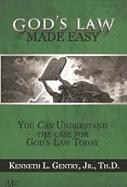
God’s Law Made Easy (by Ken Gentry)
Summary for the case for the continuing relevance of God’s Law.
See more study materials at: www.KennethGentry.com
The second commandment (Deut. 5:8–10) emphasizes God’s dignity, especially in worship. It is expanded on in Deut. 12:1–32. For example, in discouraging the adoption of Canaanite religious altars and worship practices (12:1–3), Israel must follow God’s priestly system and establish a central, unified sanctuary in the land to protect her worship of the one true God (12:4–32).
The third commandment (Deut. 5:11) presses the importance of God’s name, calling on Israel to be serious in her relationship with him. This is covered in Deut. 13:1–14:21. For example, this section condemns false prophets (13:1–18), which are a test of the Israel’s commitment to God alone. It also reminds her to keep his dietary laws in demonstrating her distinctive commitment to him even in the mundane things of life (14:1–21).
The fourth commandment (Deut. 5:12–15) requires observing the sabbath in demonstrating thanks to God for his deliverance (Deut. 5:15) and for his good gift of creation (Exo. 20:11). It is applied in Deut. 14:22–16:17. For example, this section calls for thanking God by faithfully tithing to him (14:22–29) and keeping sabbath years (15:1–18) and the special national feasts of celebration (16:1–17).
The fifth commandment (Deut. 5:16) highlights the proper exercise of human authority, requiring that it conform to God’s will. It is covered in Deut. 16:18–18:22. For example, this section highlights various levels of authority beyond its starting point in parental authority. It discusses judges (17:2–7), kings (17:14–20), priests/Levites (18:1–8), and prophets (18:9–22).
The sixth commandment (Deut. 5:17) calls for the respect of life, especially underscoring the dignity of human life. It is treated in Deut. 19:1–22:4. For example, while defending human life and condemning murder, this material distinguishes accidental deaths, explains legal protections for those who have killed someone (19:1–10), and encourages proper judicial proceedings (19:11–13). It also sets apart just war as an example of when life may be taken with immunity (20:1–20) and demands execution for capital felons (21:22–23).
Lord of the Saved
(by Ken Gentry)
A critique of easy believism and affirmation of Lordship salvation. Shows the necessity of true, repentant faith to salvation.
See more study materials at: www.KennethGentry.com
The seventh commandment (Deut. 5:18) warns against sexual sins and immoral intermixing of things which should not be mixed together. It covers 22:5–23:14. This commandment is the most difficult to discern in its section. But given the relative clarity of the ten commandments outline in the remainder of the Deut. 6:4–26:15, it would seem to be required. For example, various types of sexual sins include transvestism (22:5), sexual charges against a wife (22:13–20), adultery and fornication (22:22–24), rape (22:25–29), and incest (22:30), each of which threatens the unity of the family and the community. This law is illustratively reinforced by discouraging the mixing of seeds, animals, and clothing fibers (22:9–11)
The eighth commandment (Deut. 5:19) explains why stealing is immoral. It is covered in Deut. 23:15–24:7. This section enforces ownership rights and encourages respecting others. For example, it covers the problem of escaped foreign slaves (23:15–16) and implies that offspring forced into prostitution steals their self-respect (23:17–18). It continues by prohibiting charging interest on poor loans which robs the poor of their ability to escape debt (23:19–20), and robbing God by refusing to pay vows (23:21–23).
The ninth commandment (Deut. 5:20) requires honesty in one’s witness, promoting confidence in the truth. This is briefly covered in Deut. 24:8–16. For example, this section demonstrates the danger of dishonesty in Miriam’s false charge against Moses (24:8–9), warns about a lack of trust in handling pledges (24:10–13), condemns disrespectfully failing to promptly pay workers (24:14–15), and prohibits criminal witness against innocent family members of criminals (24:16).
The tenth commandment (Deut. 5:21) rebukes covetousness, which is a desire for something that belongs to another. Moses applies this matter to situations denying a person’s rights and privileges regarding his own property and life. This material is found in Deut. 24:17–26:15. For example, this section warns that coveting perverts justice for the weakest members by taking all they have as a loan pledge (24:17–18) or denying them access to the overage from one’s crops (24:19–20).
Conclusion
Though most evangelicals demur from even considering the application of God’s law today, the postmillennial hope expects its influence. The apostle to the Gentiles even declares against objectors: “Do we then nullify the Law through faith? May it never be! On the contrary, we establish the Law” (Rom. 3:31).
In fact, Paul noted the law’s intrinsic goodness and practical relevance for restraining sin and protecting righteousness, even including its judicial sanctions: “we know that the Law is good, if one uses it lawfully, realizing the fact that law is not made for a righteous person, but for those who are lawless and rebellious, for the ungodly and sinners, for the unholy and profane, for those who kill their fathers or mothers, for murderers and immoral men and homosexuals and kidnappers and liars and perjurers, and whatever else is contrary to sound teaching, according to the glorious gospel of the blessed God, with which I have been entrusted” (1 Tim. 1:8–10).

March 1, 2022
1 COR 15:45 & CHRIST’S RESURRECTION
 PMW 2022-017 by Kenneth L. Gentry, Jr.
PMW 2022-017 by Kenneth L. Gentry, Jr.
A Reader’s Question
Recently a reader wrote to me regarding an article by Sam Frost that I published. He commented:
“Thank you for sharing this! Mr. Gentry, I enjoyed your book Before Jerusalem Fell. As far as ‘full’ and ‘partial’ preterism; I have a lot to learn and am still undecided. If Jesus will literally return in a physical body, could you please explain 1 Cor.15:45 to me?”
Thanks for reading. And for writing. I appreciate your studying God’s word. And I certainly hope and pray that you won’t drift away from historic, orthodox Christianity!
The Interpretive Problem
What does 1 Corinthians 15:45 say that might confuse folks and encourage an aberrant movement? The Mormons love 1 Corinthians 15:29; the hyper-preterists love 1 Corinthians 15:45. This passage reads:
“So also it is written, ‘The first man, Adam, became a living soul.’ The last Adam became a life-giving spirit.”
How are we to understand this? Was Paul teaching us that Christ left his material body behind in becoming a non-material spirit-being? And that we also are to anticipate the same? Not at all! Has the universal, historic, orthodox, public, systematic, corporate church been mistaken since its very beginning? Absolutely not! What then is going on here?
The Proper Understanding
What Paul is doing in 1 Cor. 15 is arguing for the physical resurrection of Christ (vv. 4–7, 12–14, 16–17). He does so in order to drive home an important point that is being overlooked by many gnostic trouble-makers in the Corinthian church (a church filled with much error). He is concluding an argument he began several chapters earlier.
He is pointing out the great glory of the resurrection of Christ and how it impacts our own ultimate resurrection. He contrasts “soulish” (Greek, psuchos) bodies and “spiritual” (Greek, pneuma) bodies. That is, he is contrasting bodies controlled by the”soul” and its natural animal appetites over against glorified bodies no longer controlled by animal appetites, but by spiritual realities.
Have We Missed the Second Coming: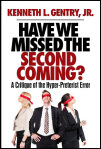
A Critique of the Hyper-preterist Error
by Ken Gentry
This book offers a brief introduction, summary, and critique of Hyper-preterism. Don’t let your church and Christian friends be blindfolded to this new error. To be forewarned is to be forearmed.
For more Christian educational materials: www.KennethGentry.com
In v. 45 he is pointing out that Christ is the last (final, perfect) Adam and that his influence is superior to the first Adam. The first Adam simply became a living “soul” with basic animal needs, such as food, water and so forth. This is why it was necessary for God to put Adam in a garden and give him food to eat (and water to drink). This physical life comes also with the potential for lustful desires which can overthrow the spiritual calling of God. Hence, God’s testing of Adam regarding the Tree of the Knowledge of Good and Evil (Gen. 2:15-17). Adam eventually succumbed to such a desire, resulting in the Fall (Gen. 3). Thus, Paul is pointing out that Adam was simply a living person with no inherent power to perfect his descendants. The first Adam, then, was merely a life-receiving being. He could not give the perfect life.
But the Last Adam (Christ) did not simply exist as a living soul (psuchos), a living person; he did not simply receive physical life. Rather he was also the source, the giver of the true perfect, spiritual life that is controlled not by animal appetites, but by God and his will. Therefore, Paul points out, our future resurrection body will be a body controlled by spiritual realities (a “spiritual” body) and not subject to the fallen world of the “soulish” desires like Adam who succumbed to temptation by desiring to eat what God had forbidden (Gen. 3). (The “spiritual body” is no more made of spirit than a Coca-Cola bottle is made of Coca-Cola.)
Thus, Paul’s point in v. 45 and following is: the Spirit-controlled life only comes from Christ the giver of that high spiritual life that perfectly glorifies God. And the fullness of that Spirit-controlled life comes only at the resurrection when the new, Spirit-animated body arises to its final, eternal form with no further capacity to sin and fall.
Tongues-Speaking: Meaning, Purpose, and Cessation
(Book) by Ken Gentry
A careful study of the biblical material defining the gift of tongues.
Shows they were known languages that served to endorse the apostolic witness
and point to the coming destruction of Jerusalem, after which they ceased.
See more study materials at: www.KennethGentry.com
Consequently, in chapter 15 Paul is rebuking those at Corinth who are infected with gnostic ideas and who therefore are claiming they have finally reached the full pneumatic-stage of existence and all that is involved in Christianity. He is pointing out that they have not. They are not already perfect in their daily lives. They must await the final resurrection which was prepared for in Christ’s historical resurrection.
Thus, he would say, even though we now have the Spirit in anticipation of the final order, we are not so fully controlled by the Spirit as to have “finally arrived” in perfection. This must await the final order. For now we must keep striving against sin. This is why he can write in Romans 8:23: “And not only this, but also we ourselves, having the first fruits of the Spirit, even we ourselves groan within ourselves, waiting eagerly for our adoption as sons, the redemption of our body.”
Paul has been building this argument since the in-depth references to the pneumatika, the spiritual gifts, in the preceding chapters (1 Cor. 12-14). He has been rebuking several errors of the gnostics, such as their claim that physical prostitution is irrelevant to the Christian life (1 Cor. 6:15-16), that physical, intimate relations with one’s spouse are unnecessary (1 Cor. 7:1-4), and so forth. Thus, 1 Corinthians 15:45 must be understood in terms of Paul’s larger argument and not divorced from its context.

February 25, 2022
CHRIST’S RESURRECTION IN 1 COR 15
 PMW 2022-016 by Kenneth L. Gentry, Jr.
PMW 2022-016 by Kenneth L. Gentry, Jr.
Awhile back a reader/listener of mine expressed some confusion with some statements I made. He asked me to clarify my point to clear up his confusion. Here is a part of the exchange, which might be helpful to others who may have had the same concerns.
Reader (1st inquiry):
I am currently listening to your lecture (sermon?) entitled “Ken Gentry on 2 Thessalonians 2 – The Man of Lawlessness”. In that message you state that “the second coming” will occur at the end of time. According to your understanding, what will the second coming of Jesus the Christ be like when it does occur? What will actually take place during that “second coming”?
Gentry (1st reply):
Christ will physically return, physically resurrect the dead, and call up his own. Then he will conduct the Final Judgment, establish the consummate new heavens and near earth, which believers will inhabit while the lost will be consigned to hell. Glorious for us; grim for others.
These physical events are anticipated in spiritual realities occurring now. He spiritually comes to receive us into heaven when we die — as he did each of the disciples (John 14:3), spiritually resurrects us to new life at the moment of salvation (Eph. 2:5-6), and makes us a spiritual new creation (2 Cor. 5:17). The paralleling of the spiritual and physical resurrection are clearly drawn in John 5:24-29.
Have We Missed the Second Coming:
A Critique of the Hyper-preterist Error
by Ken Gentry
This book offers a brief introduction, summary, and critique of Hyper-preterism. Don’t let your church and Christian friends be blindfolded to this new error. To be forewarned is to be forearmed.
For more Christian educational materials: www.KennethGentry.com
Reader (2d inquiry):
Thank you for your prompt and interesting response. What do you mean by “physically resurrect”? According to your understanding, what is “the consummate new heavens and near (new?) earth”? Where will they be located? What all will be included in them? Or is the new heavens and new earth established as one entity?
Gentry (2d reply):
Physical resurrection means bodily resurrection. Our material bodies will be resurrected and reconstituted. God created angels to be spirit-beings, he created man to be a material being. And he sanctified that reality by his Son becoming a material (human body) being. We are composed of body and spirit. Our final estate will be a reuniting of spirit and body.
The NHNE will be basically like the present one, but without sin involved (2 Pet 3:9ff). The universe will be located all over the place, like now.
Reader (3rd inquiry):
Are you saying that the NHNE does not at present exist? And because it does not exist, no one, not even the persons to whom Peter writes in the first century (1Peter 1)?
Gentry (3rd reply):
The NHNE exist presently in spiritual form in the believing community, it will exist physically in consummate form forever. Like we are spiritually resurrected (saved) now in anticipation of our one day being physically resurrected (John 5:25-29). Theologically this is known as the now / not yet principle.
Reader (4th inquiry):
Thank you for the link to your materials on resurrection. Do you have a document that expounds in much more detail on this statement: “Christ’s was unique for the time, but it spoke of others to follow at “the end” (v. 24). Thus, the resurrection of Christ as the first-fruits is: (1) the first of this order to occur, (2) represents his people’s resurrection, and (3) expects more eschatological resurrections to follow at the end.”
Are you here stating that Paul teaches the Corinthians that resurrection occurs in three stages? Stage 1. Jesus; stage 2. The people that are His; stage 3. (the final stage) at the end of time?
Postmilllennialism and Preterism
Four lectures by Ken Gentry (downloadable 4 mp3s).
(1) Postmillennialism: Wishful Thinking or Certain Hope?
(2) The Identity of the Beast of Revelation.
(3) The Resurrection of the Dead.
(4) The Great Tribulation is Past.
See more study materials at: www.KennethGentry.com
Gentry (4th reply):
Any standard (non-dispensational) commentary on 1 Cor 15 should answer your questions.
No, not three stages. Jesus’ resurrection is the fore-runner to ours, the pledge of it, not the first stage. The last resurrection is of all men simultaneously, with differing results for the lost as compared to the saved. There is one day of final resurrection (John 5:28-29).
Reader (5th inquiry):
I find the following statement, which I found in your article, “Our Eschatology Resurrection” very puzzling: “Christ’s (resurrection) was unique for the time, but it spoke of others to follow at “the end” (v. 24). Thus, the resurrection of Christ as the first-fruits is: (1) the first of this order to occur, (2) represents his people’s resurrection, and (3) expects more eschatological resurrections to follow at the end.” (Emphases added)
I get it that Christ’s resurrection was “unique” all though I would greatly appreciate your personal explanation of why it is “unique”. And I understand the idea “that it spoke of others at “the end” which I assume that you are quoting from 1Cor 15:24 “then the end.” However, you do refer to “this order” of resurrection which I assume is a reference to verse 23a: “But each/every man in his own order…” However, you never actually provide any specific exegesis of 1Cor 15:23. Then, seeming to comment on “this order” you write, “(2) represents his people’s resurrection, and (3) expects more eschatological resurrections to follow at the end.” “The end” apparently being a quote from 1Cor 15:24a. Thus, the whole statement seems somewhat ambiguous to me.
Please correct me if I am wrong, however, it seems to me that you are stating that the “order” of resurrection is accomplished in three “pledges,” steps, or stages (whatever you wish to call it): “first” step, the unique resurrection of Jesus the Christ; (step 2) the resurrection of His people; (step 3) “more eschatological resurrections to follow at the end”. It seems quite clear to me that you are stating that the unique resurrection of Christ occurs (step one) and then later is followed by the resurrection of His people (step two), which is later followed by the resurrection of “the rest of the dead” (more… resurrections to follow at the end) (step three). The above is that which I understand Paul to be writing.
Gentry (5th reply):
The uniqueness of Christ’s resurrection at that time was that it was an actual eschatological resurrection whereby he arose again in an eternal, indestructible body. He left this world and entered heaven in his physical body, never to die again (Acts 1:9–11; Heb. 7:25). He is in heaven “in bodily form” (Col. 2:9; cp. Acts 7:56). No one had ever been resurrected like that before. Thus, his resurrection was “unique.” All others who were resurrected before the end of history would die once again to await the eschatological resurrection where they would receive their consummate, eternal, renewed bodies.
When speaking about Christ as the “first-fruits,” I wasn’t referring to three steps of the resurrection. After all, points 2 and 3 in my note don’t refer to separate stages at all. My three points were explaining three different aspects of the significance (not phases, steps, stages) of the concept of “first-fruits.” That is:
Regarding my first point, Christ’s resurrection is unique, in that it was the first eschatological resurrection. His resurrection was not simply a temporary revivification of a corpse, which would eventually undergo death once again. Thus his resurrection is the first of the eschatological order.
In #2 I meant that as a “first-fruit” it also pictures the nature of his people’s own eschatological resurrection. He was not to be the only person ever given an eschatological resurrection with an indestructible, ever-living body (1 Cor. 15:42–43). That is, our resurrection will be of the same nature as his: eschatological, eternal, not a temporary revivification. Thus, my point had nothing to do with a distinct phase from a following eschatological resurrection.
My point # 3 was noting out that Christ’s resurrection was only one resurrection, but it was designed to expect many more resurrections at the final day. As the first-fruit his was a pledge of more to come, like the first-fruit of a harvest indicates more harvest to come.
Thus, my reference to three matters was not concerned with stages, steps, phases of resurrection. Rather it was highlighting three aspects of the nature of the first-fruit character of Christ’s resurrection.

February 22, 2022
RESURRECTION, PAUL, & ACTS 24:15 (2)
PMW 2022-15 by Kenneth L. Gentry, Jr.
In my previous article, I began a brief consideration of Acts 24:14–15. This passage is often used by Hyper-preterists in an attempt to demonstrate that the corporate, public, universal, systematic Christian faith has not been mistaken on one of its foundational doctrines for 2000 years. They mistakenly hold that this passage points to the expectation of a first-century resurrection of the dead.
In my opening article I focused on the lexical issues involved in the key term mellein in this passage. They believe it means “about to,” which it does not. Please read that article to orient yourself to the argument. In this article I will conclude by noting their syntactical and contextual error.
The syntactical data
Second, syntactically when mello appears in conjunction with a future infinitive (as here in Acts 24:15) it indicates certainty. In Acts 24:15 mello appears as mellein, a present active infinite, which becomes a helping verb for the immediately following word esesthai, the future middle infinitive of eimi (“to be”).
The Baur-Arndt-Gingrich-Danker Lexicon states: “With the future infinitive mello denotes certainty that an event will occur in the future.”
The phrase appearing in Acts 24:15 occurs only two other times in the New Testament (Acts 11:28 and 27:10). But it also appears in Josephus, and in a closely related construction in Diognetus.
In Acts 27:10 Paul warns the captain of the ship he was on: “Men, I perceive that the voyage will certainly be [mellein esesthai] with damage and great loss.” The pilot and the captain of the ship disagreed and forged ahead. Paul was prophesying the ship’s wrecking as a certain event.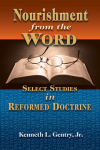
Nourishment from the Word
(by Ken Gentry)
Reformed studies covering baptism, creation, creeds, tongues, God’s law, apologetics, and Revelation
See more study materials at: www.KennethGentry.com
In Acts 11:28 Agabus prophesies “that there would certainly be [mellein esesthai] a great famine all over the world.” And we read that it most certainly did come to pass in the reign of Claudius.
In fact, in the Exegetical Dictionary of the New Testament (2:403) we read that “in Acts mello contains no suggestion of a near future.”
In Josephus’s Antiquities of the Jews 13:12:1 the same phrase is used of a certain future occurrence:
“The occasion of which hatred is thus reported: when Hyrcanus chiefly loved the two eldest of his sons, Antigonus and Aristobutus, God appeared to him in his sleep, of whom he inquired which of his sons should be his successor. Upon God’s representing to him the countenance of Alexander, he was grieved that he was to be the heir of all his goods, and suffered him to be brought up in Galilee. However, God did not deceive Hyrcanus; for after the death of Aristobulus, he certainly [mellei esesthai] took the kingdom.”
In Diognetus 8:2 we read: “Dost thou accept the empty and nonsensical statements of those pretentious philosophers: of whom some said that God was fire (they call that God, whereunto they themselves shall go [mellousi choresein], and others water, and others some other of the elements which were created by God?”
This is why none — not one — of the standard translations of the Acts 24:15 translate mello as expressing nearness. Rather they translate it simply as a future, certain event (see: KJV, ESV, NEB, NIV, NAB, NKJV, NRSV, etc.). The NASB (cited above) has an excellent rendering: “having a hope in God, which these men cherish themselves, that there shall certainly be a resurrection of both the righteous and the wicked.”
This is why, also, we do not find Acts 24:15 used by liberals to show the error of prophecy in the Bible. That is, no liberal commentator points to this verse as evidence that Paul made a mistake, though they point out other near-term passages as involving error (though they wrongly interpret those texts): texts such as Mark 9:1 and Matthew 24:34.
For instance, we note that Mark 9:1 is brought up as an error for expecting the near-term return of Christ in: The Intepreter’s Bible, The New Century Bible Commentary, and Meyer’s New Testament Commentary. But Acts 24:15 is never mentioned as such in these commentaries.
The contextual data
Third, contextually: Paul’s argument in Acts 24 supports this idiomatic usage of the certainty of the resurrection, rather than of its nearness.
Paul is on trial for his life, having been brought to court by Jews. His clever maneuver is to divide his opponents against themselves: the Pharisees believe in a resurrection of the dead; the Sadducees do not (cp. Acts 23:6–7). Thus, Paul argues for the certainty of the resurrection (by use of this idiomatic expression, mello esesthai) and concludes: “For the resurrection of the dead I am on trial before you today” (Acts 24:21). He is not on trial for declaring the resurrection is near, but is attempting to gain the hearing of the Pharisees over against the Sadducees on the fact of the resurrection.
Getting the Message
(by Daniel Doriani)
Presents solid principles and clear examples of biblical interpretation.
See more study materials at: www.KennethGentry.com
Note also a little more fully what he states as he defends his Christianity (called “the Way”): “But this I admit to you, that according to the Way which they call a sect I do serve the God of our fathers, believing everything that is in accordance with the Law and that is written in the Prophets; having a hope in God, which these men cherish themselves, that there shall certainly be a resurrection of both the righteous and the wicked” (Acts 24:14–15).
Consider two further important observations: Here he is asserting the resurrection as (1) a fact of Scripture (i.e., the Old Testament) and (2) as being held by the Jews (the Pharisees and their followers) themselves. He declares it a fact of Scripture when he states: “believing everything that is in accordance with the Law and that is written in the Prophets.” And he also declares that “these men cherish [this truth] themselves.” We see the resurrection in the Old Testament (e.g., Job 19:25–27; Isa 26:19) and in intertestamental Judaism (e.g., 2 Macc 7:9, 14, 23; 12:43; 1 Enoch 51:1; Josephus, Wars of the Jews 2:8:14; Antiquities 18:1:3).
He is surely not arguing that the Old Testament prophesied that the resurrection would occur “soon”! Nor would he be affirming that the Pharisees believed it was fast approaching. He is speaking of its certainty not its nearness. Thus, the Hyper-preterist use of this verse is erroneous.
Kenneth L. Gentry Jr.'s Blog
- Kenneth L. Gentry Jr.'s profile
- 85 followers



